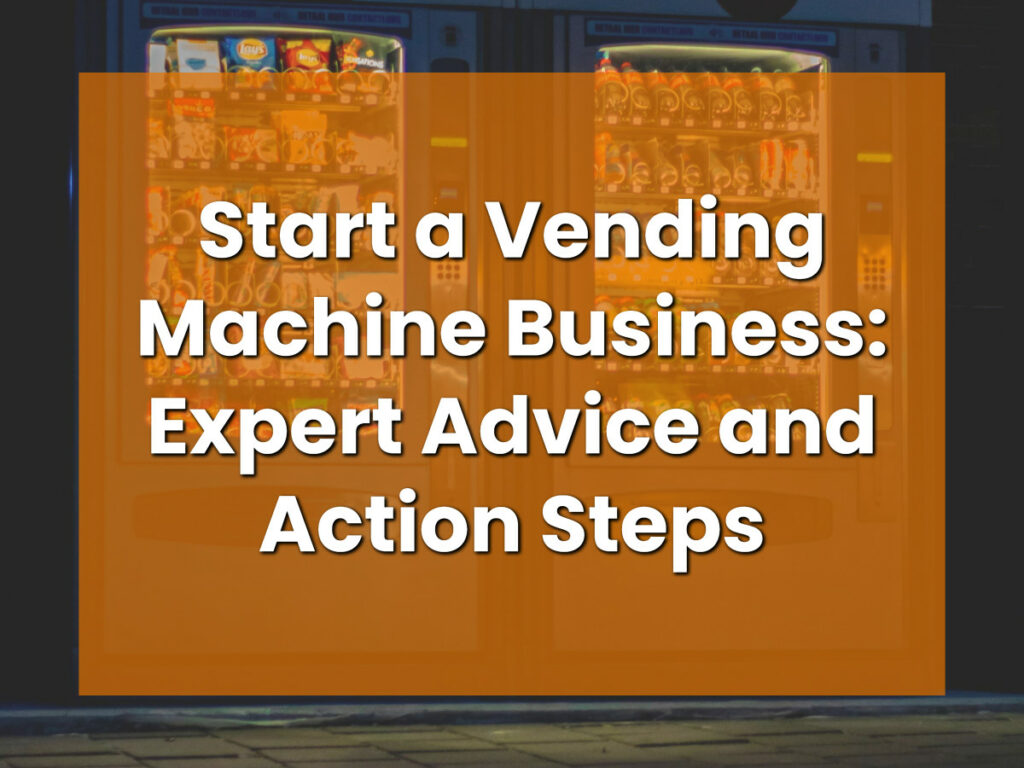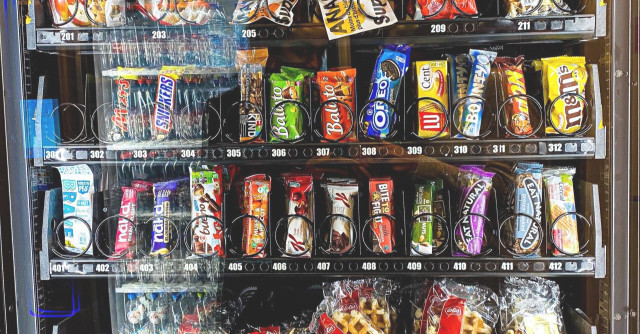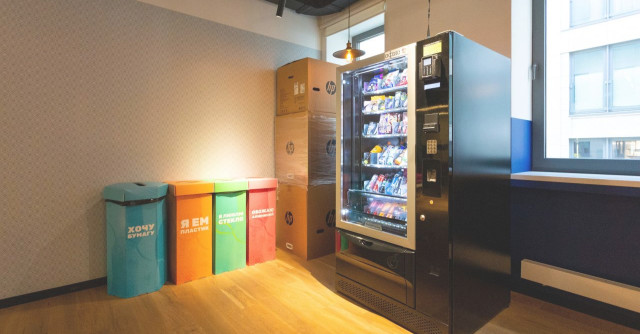5 Steps to Start a Vending Machine Business: Expert Advice and Startup Help

The vending machine business can be profitable in a fairly short period with the right plan and products. In the US alone, vending machines brought in over $36 billion in 2020 and are expected to hit over $146 billion a year by 2027. Hospitals, schools, office buildings, and shopping malls are just a few popular sites for food and beverage machines. Convenience food is extremely popular in places like bus stations, airports, and hotels too.
You can make money from vending machines wherever there’s a lot of foot traffic. If you have enough funding to buy more than one machine, that’s great! But if resources are limited, you can still save the profits from one machine to buy additional machines down the road. The important thing is to do your research, make a business plan, offer the right products, and build trust with clients.
Find out how to form a Limited Liability Company (LLC) or Corporation for your new venture with our step-by-step guide and links to start a vending business. For over 20 years, MyCompanyWorks has helped vending startups across the US. Read on for pro tips and start forming your company at the end of our guide.
- How to Start a Vending Machine Business
- How to Get Into the Vending Business
- Vending Machine Locations
- 1. Choose a Name and Business Type for Your Vending Machine Business
- 2. Write a Business Plan
- 3. Employers Must Apply for a Federal Tax ID
- 4. Open a Separate Business Banking Account
- 5. Find a Shop, Warehouse, or Office Space
- 6. Apply for Local and State Licenses and Permits
- 7. Start Business Insurance Policies
- 8. Set Up Business Accounting and Keep Files Organized
- 9. Interview and Hire Employees
- 10. Promote Your Vending Machines
- Start a Vending Machine Business in Any State
How to Start a Vending Machine Business
Starting a vending business can be a great way to break into self-employment. It’s easy enough to manage as a side hustle or build into a full-time business. You only need one vending machine to start and you can buy additional machines with profits, so the business can quickly start to pay for itself. So you have the idea, now where to begin?
Before you spend a dime or sign any contracts, you’ll want to do some research on profitability, market, and which types of vending machines are the best investment. You’ll also need to contact your state’s business division for the exact requirements in your area.
How much money do vending machines make?
Vending machines are a great source of revenue for any business. The average cost of a vending machine is about $3,000 to $5,000. This would include the machine itself, the shelving unit, and all other necessary equipment like a refrigerator or freezer for cold drinks. The average cost of maintaining and stocking a vending machine can run up to a few thousand dollars a year.
Maintenance includes things like fixing broken parts or replacing light bulbs. The profit margin on most vending machines is around 50%. This means that out of every dollar you spend on your goods in a vending machine, half the money is profit.
How to Get Into the Vending Business
Starting a vending business
Owning a vending machine is just part of your business. Before you spend any money, the following items need to be considered.
- Develop a vending machine business plan. If you have cash, you may not need a business plan, but it also serves as a tool to track progress and forecast future sales.
- Research the market. You’re probably not going to make a bunch of money on a toy machine in a senior community, so it’s important to know which products sell best to various demographics. Example: If you’re pitching your machines to medical offices, you can offer products like fruit snacks and peanut butter crackers to a pediatrician, and skincare products to a dermatologist.
- Develop a contract. Contracts can be customized for each client, but working from a template will help to make sure all the important legal stuff is included, like terms, payment, site location, etc. Handshakes don’t hold up in court, so it’s always best to put your agreement in writing and have clients sign the contract. Make sure to give your client a signed copy.
- Practice your sales pitch, make a list of potential clients, and reach out! It may take some time to perfect your sales pitch, but you can start by learning your product. Any good salesperson knows his or her products inside and out so questions can be answered quickly and you can hopefully seal the deal on the spot. Product knowledge is critical for every business.
- Set up a service schedule. Since you own the machine(s), you’re responsible for stocking products, fixing broken parts, and keeping your machines clean. Fully-stocked dispensers that are clean and maintained sell more than machines that are just left to sit. The best way to keep machines performing well is to visit them regularly. You’ll have to decide how often to check your machines based on product shelf life, how quickly product is selling, and the age of the machines. You may be able to manage a monthly route, but some machines may need more frequent checkups.
Vending Machine Locations
A vending machine can be placed in all sorts of locations, but there are some that are better than others. The best placement is in high traffic areas, so bus stations, airports, hotels, and grocery stores are just a few options to start making money. People who travel often need to eat on the go and may not have time to go into a restaurant or convenience store. Machines with snacks and drinks are very profitable when they’re set up near travelers.
IMPORTANT: You must have permission from site owners to set a vending machine on their property. A signed contract will help prevent confusion and conflicts over machine locations.
Vending business tips
- Study the market to help you decide what type and where to set up vending machines. You want to make sure you’re offering the right products to the right people. It’s important to know things like age groups, average income, and even daily foot traffic to choose the best site locations.
- Chart progress – and mistakes. A vending machine business plan and some other helpful tools will give you a realistic picture of your business. Use them to track everything from ideas to financial projections. Noting what hasn’t worked will help you to A: not repeat the mistake, and B: tweak your strategy toward success.
- Develop a regular schedule to service your machines. Vending machines can be serviced without much notice, but you have a better chance of keeping your site locations if you get to know your customers. And if you’re good to the site owners, they’ll look out for your machines and make sure they’re not being robbed or vandalized. Checking in often also means you’ll be able to rotate products and keep things fresh between visits.
The only way you’re really going to know if your machines are secure, functioning, and clean is to visit your machines regularly and often. If your machines accept cash, they’ll need to be emptied. Clean vending machines make more money, so take cleaning rags, glass cleaner, and paper towels on your service trips. Vending machines also get stuck and break down, so make sure you have the right tools with you to make any minor adjustments or repairs. - Keep an eye on market trends. Check out TV commercials and social media to see what’s new and popular, then find out if you can add those products to your machines. For instance, eco-friendly and natural products are gaining popularity, so you might be able to stock products with these features to appeal to a growing audience.
- If you hire employees, make sure to spend enough time training them properly. If you do have employees, identify at least one who can manage the business in your absence. Investing time and money on training will ensure that your business is being represented well and reduces turnover, which also reduces costs for constant training. Training should be conducted when employees start so that they can familiarize themselves with working processes.
- Pay attention to the numbers. If you’re not great with accounting, hire an experienced bookkeeper or accountant to manage your books and taxes. Simple accounting software is easy to set up and run if you want to manage your own books. Whatever you do, make sure to keep books current and accurate to prevent late fees, penalties, and interest. Keeping your books up-to-date and filing your taxes on time can save hundreds, even thousands of dollars.
MyCompanyWorks Premium™ automatically files annual reports and monitors business compliance. Check out our blog for more information on starting and managing a business.

1. Choose a Name and Business Type for Your Vending Machine Business
Name your company
Keep the following in mind when naming your company: the name should reflect what you do and should also be easy to remember. Choose a name that describes the nature of your business. A name like “Ace’s Vending Machines” tells clients exactly what you’re selling. Try out names on your friends. Ask them if possible names communicate your message clearly. If they didn’t know you, would they be able to identify your products or services?
The right vending business entity – LLC, Corporation, or DBA
The most common business type for startups is the Limited Liability Company or LLC. A vending business LLC would be a good fit for most small businesses, but if you’re not sure which business type to start, an accountant or lawyer can discuss options and help you decide.
- LLC: One of the most popular business structures for startups is an LLC, which helps keep taxes low and ownership flexible. With an LLC, you don’t file a “business” tax return each year. Instead, you report business profits and expenses on your personal tax filings.
- Corporation: The Corporation entity type is usually only necessary for larger companies or businesses with complex models. Qualifying corporations can file for Subchapter S – or “Small Business” status with the IRS, so you’re still taxed as an individual. In our experience, the Corporation structure can be overkill for a small company, so be sure to contact an attorney or accountant before forming a Corporation.
- DBA: DBA stands for “Doing Business As” and is a type of business registration that you can use instead of registering a separate company. A DBA isn’t a separate entity like an LLC or Corporation, so you’ll have to use your social security number for tax and legal purposes.
TIP: Consider forming an LLC or Corporation to protect your personal assets from tax liens and lawsuits.
2. Write a Business Plan
Does a vending company need a business plan?
The short answer – is yes. A business plan is a piece of the puzzle to let investors know your idea and give them the assurance that you can generate profits. It also helps you find an investor who shares your vision. To get financing, you will need a business plan that spells out your goals and how your business is going to meet them.
The original business plan may change over time, but it’s easier to write an effective plan at the beginning of the business. This is where business plan templates can come in handy, as they’re designed to be customizable and flexible enough to fit the needs of your company. Check out our Business Planning Resources for help and more information.
What is included in a good business plan?
Every good business plan includes an executive summary that includes your company’s mission statement and a description of your company and the benefits you offer. Include more specific details, such as pricing and marketing strategies, in the other sections of the plan. The marketing strategy should detail how you will promote your services to potential clients, while the financial portion explains startup and ongoing costs, expenses, and revenues. A business plan is invaluable for organizing and tracking your goals, improving your methods, and collecting the tools and resources you will need for achieving your objective.
Business plan categories
- Executive summary including company description, mission statement, and benefits
- Pricing and marketing strategies
- High-traffic markets and proposed locations if possible
- A list of products, like snacks, drinks, sundries, etc.
- Financial projections for the first year
Find funding for startup and maintenance costs
NOTE: Investors may want you to find a location – Step 5 – to estimate build-out and rent costs before you apply for funding, but you can write a basic plan that can be updated for each application.
Initial costs for a vending company can be fairly low compared to other businesses. Top-notch machines can run around $10,000, but you can save a lot of money on refurbished machines. If you’re willing to start with used equipment, you could register and open your business for around $2,500, depending on your state’s fees and requirements. If you’re leasing space, you’ll also have to pay for utility connections and any inspections required by your county. See costs to register an LLC or Corporation in your state here.
Funding opportunities
- Personal savings, home equity, and retirement accounts are great places to look for funding. You’re borrowing from yourself, so there isn’t as much risk involved as when you’re dealing with other people’s money.
- If you have supportive family and friends, you could draw up a loan agreement to borrow money from them. The Federal Reserve Survey of Consumer Finances says family and friends lend about $89 billion each year in the US. 38% of small business startups borrowed funding from friends and family. Write a realistic payment agreement that gives family and friends an incentive to loan you money. You can use things like interest, free product, or maybe even free vending machine placement if they have business locations. Debt.org has a great article on the right time to borrow money from family and friends.
- Angel investors are usually wealthy individuals who offer working capital in exchange for a percentage of your business. Angel.co is probably the most popular angel investor portal, but sites like Gust and Funded.com also list great funding opportunities.
- Crowdfunding is easy to operate and can generate startup cash quickly. Kickstarter, SeedInvest, and IFundWomen have a simple account setup and helpful tips to increase the success of your fundraising campaign.
TIP: A solid business plan should include revenue and expense projections to determine how much funding you’ll need. Fundraising doesn’t have to be just for startup costs. Many small businesses apply for funding for expansion and may do so more than once. A creditworthy business is what impresses investors, so make sure bills, payroll, taxes, and business fees are all processed on time.

Related Helpful Resources
Write Your Small Business Plan Now | Should I Start an LLC, Corporation, or DBA? | Build Business Credit Online
3. Employers Must Apply for a Federal Tax ID
A unique Federal Tax ID, or Employer ID Number, is assigned to each US business that employs workers. The EIN is used in conjunction with the company’s name and address to identify the company. You can apply for a Tax ID on the IRS website you have a Social Security Number. International business owners may have to provide additional verification requirements.
TIP: Add an EIN application to your business startup order, and we’ll do the rest.
What are the benefits of having an EIN?
An EIN is one of the first things you should apply for if you want to open a business bank account, hire employees, and register to pay taxes. If your business is registered as a ‘’Doing Business As’’, or DBA this won’t be necessary unless you hire staff. If you don’t have an EIN, your personal social security number will be required in place of the EIN. To keep personal and business matters completely separate, we suggest that all businesses should register for an EIN.
4. Open a Separate Business Banking Account
All business payments and deposits should be run through a business bank account. When you have established solid payment history, you can also apply for credit cards in the business name. We have partnered with several business banks to make the process easy. You can also contact your personal bank or credit union to research their business options. There are many online business banks too.
Business requirements depend on a variety of factors, so it’s worth taking the time to interview a few before deciding which solution works best for your company.
5. Find a Shop, Warehouse, or Office Space
If you have a garage, you might be able to start your operating your business at home. Check with local business authorities to be sure, but working out of your garage can save a lot of money. If you’re not able to run your business at home, contact a commercial real estate broker to locate a space that fits your budget and need. Check out our Vendor Network for commercial leasing brokers.

6. Apply for Local and State Licenses and Permits
Businesses may not need to be licensed by the federal government but will have to obtain a state permit to set up and run vending machines. Search local and state websites for licensing requirements, or order a business license compliance package with your business formation order.
7. Start Business Insurance Policies
The price of vending machine insurance varies by region, with the average cost coming in between $300 – $1000. Common business insurance policies include Owner’s Policy, General Liability, and Workers’ Compensation, but there may be other required policies in your state. If you need help finding a business insurance agent, check out our partners Hiscox and netQuote. They offer free quotes and are happy to help you find the right business insurance for your company.
8. Set Up Business Accounting and Keep Files Organized
If you’re doing your own books, accounting software like Quickbooks Online is simple to set up and use. You can also hire a professional bookkeeper or accountant to do the work for you. Visit our Vendor Network for a list of recommended and qualified financial experts in your area.
For the small business owner, paperwork can often be a hassle. Everything from invoices, receipts, and bills to legal and business documents need to be organized and readily accessible. There are many ways to organize paperwork, from using cloud storage to the good ol’ paper filing cabinet. Start a system that’s easiest for you to manage. You’ll need to file paperwork in the following categories:
- Client files – information about a customer, including their name and contact details, invoices, and contracts.
- Employee files – All employee records, including job applications, W4 forms, annual reviews, disciplinary actions, etc.
- Vendor Files – Contact information, product catalogs, and contracts
- Legal Documents – Business formation paperwork, licenses, permits
- Tax Documents – All tax returns and IRS documents
IMPORTANT: All tax returns should be kept for at least 7 years after they are filed. Most other paperwork can be kept for 3 years.

9. Interview and Hire Employees
You can skip this step if you’re starting out alone. Bookmark this page for when you’re ready to hire additional help.
Recruit your team
Posting jobs online is a good way to find both full-time and part-time employees. Some of the best platforms for this are Indeed, LinkedIn, and your local job advertisement sites. Keep these tips in mind before you post your job ads for the best results:
- Write an employee handbook and train technicians
Take the time to spell out your expectations in a company handbook. Things like proper conduct, uniforms, reviews, and policies and procedures should be clearly defined. You can save a lot of time and effort by using employee training templates to write your handbook.
- Write a job description for each position
Job descriptions should be clear and easy to understand. When you have a written job description, it’s an easy reference guide for both you and the employee. Each job description should include expected tasks to be performed. Will your technicians need to be able to lift heavy objects? Does your business run after regular business hours? What are the uniform requirements?
These items can be addressed in each job description, so there’s no question about expectations. List as many details as possible to clearly define employee roles and help potential candidates decide if the vending business is right for them.
TIP: Posting a clear job description in job ads will reduce unqualified applications and unnecessary interviews.
- Post job ads, interview qualified candidates, and start the hiring process
You may receive hundreds of resumés for one job opportunity. Be prepared to weed out those who don’t even have the skills required for the position. Indeed.com has free recruitment tips to help you find the right help for your business.
NOTE: On average, small businesses interview between 6 and 10 candidates to hire one employee.
10. Promote Your Vending Machines
Digital media
Having a website is like posting a digital Yellow Pages ad. Since the internet is usually the first place someone looks for information, an active website can be used to share contact information, products, and policies.
Since you’ll be working directly with other businesses, research business-to-business (also called B2B) sales to find out how you can use email and social media marketing to reach qualified prospects.
Start a Vending Machine Business in Any State
Vending machine startups are a great idea for many entrepreneurs. Use our exclusive Startup Wizard to work through the step-by-step process to form your LLC, Corporation, or DBA in any state. The Startup Wizard is included free with every vending business startup package.
Summary
Starting a vending business can be a great way to make money. You’ll need to invest in tools, equipment, licenses, insurance, and recruiting before you start generating revenue. Sticking to a solid business plan will help you to track progress, fix what doesn’t work, and apply for funding with investors. Researching your local market will help you decide on what kinds of machines and products you want to carry.
Writing your business plan, developing a contract, practicing your sales pitch for new clients and investors, and working on a regular schedule to keep a good rapport with site owners are all important tasks for a profitable vending machine venture.
MyCompanyWorks can start your business startup order in as little as one business day. We offer a complete business package for vending machine owners. Startup wizard, all the forms, and help you’ll need to run your business available in one place. You can find lots of helpful articles and resources to run a successful company on our blog.
How Can We Help?
Don’t see what you’re looking for? Go to our Frequently Asked Questions (FAQ) page for answers to common startup questions. Call or chat with our friendly support team to start your vending company today.
This page may contain affiliate links, which means MyCompanyWorks may receive a commission if you make a purchase using these links.